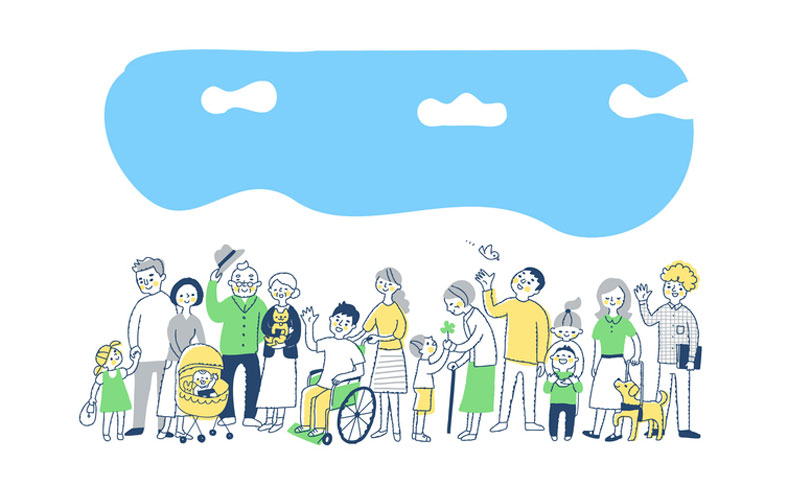Edited by Alyssa Middleton

With over 92,000 social workers, California is home to one of the nation’s largest social service networks. But while it may seem like the state doesn’t need any more social workers than it already has, that couldn’t be further from the truth.
For instance, the Public Policy Institute of California reports that about 29% of the state’s roughly 39 million residents are either impoverished or dangerously close to becoming so. On top of that, 1 in 7 California adults battle mental illness and 1 in 5 say they’ve experienced racially-motivated discrimination. And even though California is a national leader in policies that protect the LGBTQ+ community, legal safeguards aren’t always enough in day-to-day life.
This sobering state of affairs indicates that California doesn’t just need more social workers — it needs more highly-skilled social workers and needs them quickly. If you already have earned a Bachelor of Social Work (BSW) degree, enrolling in a one-year Master of Social Work (MSW) program in California can prepare you to answer that call.
One-year MSW Programs: What They Are and Common Admission Requirements
A traditional MSW degree takes about two years to earn. As the name suggests, one-year MSW programs can be completed in half that time. However, one-year programs are advanced standing programs meaning they’re designed for students who have already completed college-level social work courses and are ready to study at a more advanced level.
Because of this, one-year MSW programs in California typically have more rigorous admission requirements than traditional programs. To enroll in a one-year program, students often need:
- A Bachelor's Degree in Social Work (BSW). MSW one-year programs almost always require students to have a BSW. Some programs may also accept students with degrees in closely-related fields like psychology, sociology, or human services, but those students normally need to have taken certain social work courses to qualify for advanced standing programs.
- Prerequisite Courses. This might include case management, ethics, and other generalist social work courses taken while pursuing a BSW.
- Minimum GPA. While specific GPA requirements can vary between institutions, competitive one-year MSW programs in California often ask for a GPA of around 3.0 or greater.
- Letters of Recommendation. Letters of recommendation provide insights into an applicant's character, work ethic, and potential for success in the program. If you completed a BSW, you might want to ask professors, , or practicum supervisors to write recommendations. Programs typically ask for three letters.
- A Statement of Purpose. This document allows candidates to articulate their motivations for pursuing an MSW degree, their career goals, and how the program aligns with their aspirations.
- Relevant Work Experience and/or a Resume. Advanced standing students must typically demonstrate that they’ve had some social services or other relevant work experience.
- An Interview with Program Faculty. In some cases, programs may interview applicants to gauge their interpersonal skills, communication abilities, and their fit for the program.
These requirements ensure that applicants are prepared to thrive in an accelerated learning environment and can take on high-level social work jobs upon graduation.
Timelines and Formats
A year isn’t a long time to learn advanced social work practices. For that reason, many accelerated programs are full-time and require students to dedicate at least 40 hours per week to their studies. But despite the fast pace, many one-year MSW programs in California are designed to accommodate busy schedules.

As a one-year MSW program student, you might take classes:
- In the evening and on weekends. One-year students are often working professionals who need to take classes outside of traditional daytime hours.
- For three semesters in a row. Many undergraduate and graduate students only take classes in the spring and fall. But as an advanced social work student, you’ll likely take classes during the summer and/or winter, as well. Typically, summer and winter semesters are shorter than fall and spring semesters.
- Online. Some schools offer hybrid or totally online MSW programs. This means that you may be able to listen to lectures and interact with your peers when and where works best for you.
Remember — just because advanced standing MSW programs in California can be challenging doesn’t mean they can’t be flexible.
The Importance of Choosing an Accredited Program
Whether you’re searching for traditional or one-year MSW programs in California, choosing a program that teaches career-ready skills is vital. Schools that have been accredited by the Council on Social Work Education (CSWE) do just that.
Schools that have been accredited by the CSWE must adhere to the organization’s rigorous staffing, fieldwork, and curriculum requirements. These requirements help ensure that all social work program graduates are ready to enter the field having learned and put into practice ethical, evidence-based techniques.
In fact, many state licensing boards and social worker employers require their workers to have degrees from CSWE-accredited schools. For instance, to become a Licensed Clinical Social Worker (LCSW) in California, applicants must have completed courses through or earned an MSW from a CSWE-accredited program. But even if you don’t plan on becoming an LCSW, degrees from CSWE-accredited programs are wide
Costs and Credit Hours
Unlike bachelor’s programs (which typically charge a yearly tuition rate for full time enrollment), MSW programs usually charge by the unit or credit hour. At the Master’s level, most classes are worth around three units. One-year MSW programs in California generally consist of about 30 to 36 units spread out over three semesters. This translates to about 10 to 12 classes total but can vary between institutions.
As of 2023, the Council on Social Work Education (CSWE) lists accredited MSW programs in California that cost from about $500 to $1,000 or more per unit. These costs are subject to change. Keep in mind that you may also be responsible for paying for books, room and board, professional licensing fees, and other costs.
Worried that a one-year MSW program in California won’t fit in your budget? Learn about the many scholarship and financial aid programs open to students like you.
Common Classes Offered by One-Year MSW Programs in California
Because advanced students have already learned about the basics of social work during their BSW program, one-year programs cover advanced topics and topics related to specialties in the field. This allows students to build their knowledge by examining complex case studies and current, real-world problems. Courses vary by program, but here are a few core classes you might take.
Advanced Social Work Practice
Building on the foundational practice skills taught in BSW programs, this course delves into more complex interventions, assessment methods, and specialized approaches for working with diverse populations.
Policy Analysis and Advocacy
While students in one-year programs have likely learned the basics of social welfare policy and advocacy, advanced classes teach students how to analyze, formulate, and implement new policies themselves.

Advanced Social Work Research
This class expands on research concepts introduced in the BSW program, focusing on advanced research methodologies, data analysis techniques, and the application of research findings to inform social work practice. This often includes conducting an independent research project. Social workers who wish to pursue doctorates, PhDs, and policy-guiding roles in any number of agencies often take additional advanced research courses beyond the one course required by CSWE.
Supervision and Administration of Social Service Agencies
Effective social service leaders require an in-depth knowledge of supervision techniques, leadership skills, and policy development. This way, they can help their colleagues navigate complex legal and ethical situations.
Electives and Specializations
While students in one-year MSW programs in California take classes focused on advanced generalist practices, many programs also offer a number of electives and concentrations in specific areas of the field like:
- Clinical and direct practice (many programs prepare students for licensure as an LCSW)
- Community development and macro social work
- Substance abuse and addiction
- Mental health
- Poverty
- Child welfare
- School social work
- Aging and the elderly
- Healthcare
- Serving marginalized populations, including immigrants, different racial and ethnic groups, and the LGBTQ+ community
Some of these specialties involve taking multiple classes and seeking additional professional credentials. But whatever path you choose, program faculty can help you design a schedule that meets your goals.
The Practicum Experience for Advanced Standing Students
The CSWE mandates that all accredited programs require their students complete a certain number of practicum hours before they graduate. For BSW students, it’s 400. For traditional MSW students without BSWs, it’s 900. Accelerated MSW programs in California sometimes require fewer practicum hours (often between 600 and 800 hours). This requirement varies between schools, but what doesn’t change is the quality, diversity, and impact of the practicum experience. Tailored to their interests, students are able to select the type of setting in which they are most interested in practicing. Students then gain hands-on experience in that specialization to build skills and determine if that specialization is a good fit for them and their future goals.
In the practicum setting qualified supervisors (often MSW-educated social workers) guide and observe students as they assess clients, provide services, and participate in agency meetings. If you’ve already earned a BSW, your advanced standing MSW practicum experience will likely be similar, but you’ll be focused on carrying out the advanced techniques you learn about in class.
Start Your Search for a One-year MSW Program in California
With a Master of Social Work, you can be prepared to take on just about any advanced role in this life-saving field. You can become an administrator, a frontline supervisor, a public policy advocate, or even an LCSW who provides mental health services to communities who would otherwise suffer in silence. No matter your goal, here are a few one-year MSW programs in California that can help you get there.
Loma Linda University
School of Behavioral Health
Accreditation: CSWE and WASC
Formats: Full-time. On-campus.

Master of Social Work
- Concentrations: Clinical Practice.
Also offers:
- A two-year advanced standing option.
- Two-, three-, and four-year MSW programs with online and on-campus options.
- Certificates in drug and alcohol counseling and play therapy.
- Dual Master’s degrees in Criminal Justice and Gerontology (two- and three- year programs).
San Diego State University
School of Social Work
Accreditation: CSWE and WSCUC
Formats: Full-time. On-campus.

Master of Social Work
- Concentrations: Community Development, Administration, Clinical/Direct Practice
Also offers:
- A three-year MSW and Master of Public Health program.
- Certificates in social work administration, human services management, and early childhood education and mental health.
- Pupil Personnel Services Credential.
University of Massachusetts Global
School of Arts and Sciences
Accreditation: CSWE and WSCUC
Formats: Full-time. Online.

Master of Social Work
- Concentrations: Advanced Generalist
Also offers:
- Elective courses on topics like child welfare, military social work, loss and grief, substance abuse, and mental health.
University of the Pacific
School of Health Sciences
Accreditation: CSWE and WSCUC
Formats: Full-time. Hybrid.

Master of Social Work
- Concentrations: Mental Health, Healthcare
Also offers:
- 16-month accelerated MSW program for students without BSWs.
- BA in sociology to MSW pathway (finished in 4.5 years total).
University of Southern California
Suzanne Dowrak-Peck School of Social Work
Accreditation: CSWE and WSCUC
Formats: Full-time. On-campus, online, hybrid, and weekend/evening class options available.

Master of Social Work
- Concentrations: Adult Mental Health, Children and Families, Social Change and Innovation, School and Educational Settings, Military Populations and Settings
Also offers:
- Two- and three-year programs and part-time options.
- Dual degrees in fields like Business Administration, Gerontology, Public Administration, and Public Health.
- PhD in Social Work.



